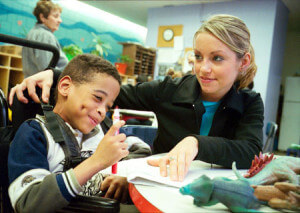Practical experience for an MSE, or Master of Special Education, always accompanies coursework requirements for the degree. Experiential learning provides aspiring special educators opportunities to apply appropriate instructional methods, behavioral principles and professional skills to real-world educational situations teaching students with disabilities. These supervised experiences build confidence in aspiring special educators while allowing them to gain mastery of critical teaching skills necessary to successfully educate those with special needs.
Practicum Experiences
Practicums are short-interval training periods where candidates are assigned to an educational site for part of a day several times weekly over a four to six week time span. Aspiring special educators spend time observing and interacting with a cooperating teacher and a variety of special education students in resource settings or collaborative classrooms. These students may have learning disabilities, behavioral disorders, attention deficits, neurological or developmental impairments or intellectual impairments. Candidates model and follow the lead teacher’s lessons for remediation and instruction with small groups, learn how Individual Education Plans are written and implemented, assist with student assessments and attend professional meetings to learn how special educators coordinate services with other school staff. Candidates often complete more than one practical experience for an MSE to gain knowledge about special education programs in all categories and confirm an area of degree specialization.
Student Teaching or Internship Experiences
 Student teaching or internship experiences provide longer, intensive training periods where candidates spend every day with a supervising teacher’s program for an eight to twelve week period. These experiences afford opportunities for candidates to focus on a degree specialization area and hone their professional and teaching skills as a lead teacher. Candidates will generally complete student teaching or internship assignments at the primary and secondary levels. After becoming accustomed to the supervising teacher’s program and caseload students, candidates are expected to gradually take over all instructional and professional responsibilities. These include accomplishing the following:
Student teaching or internship experiences provide longer, intensive training periods where candidates spend every day with a supervising teacher’s program for an eight to twelve week period. These experiences afford opportunities for candidates to focus on a degree specialization area and hone their professional and teaching skills as a lead teacher. Candidates will generally complete student teaching or internship assignments at the primary and secondary levels. After becoming accustomed to the supervising teacher’s program and caseload students, candidates are expected to gradually take over all instructional and professional responsibilities. These include accomplishing the following:
- Planning lessons and assessing progress
- Providing instruction and remediation for large and small groups
- Collaborating and coordinating special education services
- Conducting diagnostic testing
- Writing and implementing IEP goals
- Attending professional meetings during the day and after school
- Informing families about student progress
Successfully completing a student teaching experience allows future special educators to understand the full scope of their profession within their specialization area and prepares them to earn teaching endorsements and certification in the field.
State Regulations for Practical Teaching Experiences
Engaging in practical experiences is so important that states have regulations about how many clock hours aspiring special education teachers must complete to obtain their teaching certification. The number of hours varies by state, but generally falls around 300 hours each for PK-8 and secondary endorsements to work with students with moderate disabilities. Furthermore, these hours must be obtained by working in a combination of mainstream inclusive classrooms and remedial settings.
Practicums and student teaching experiences are gateways towards mastering the complex set of professional skills required to teach exceptional needs students. These experiences also lay the foundations for future certification and licensing in the field. As a result, candidates who successfully complete a practical experience for an MSE are better prepared to meet the educational needs of exceptional students.



